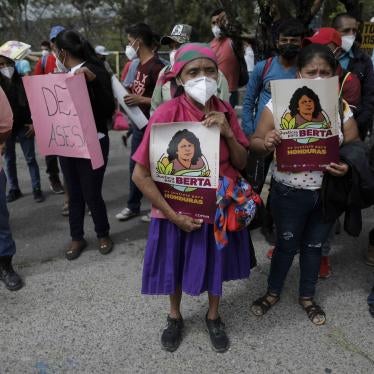(Washington, DC) – Honduras’ new government should enact reforms to better protect basic rights and the rule of law after years of setbacks since the 2009 coup, Human Rights Watch said today in releasing a letter to President Xiomara Castro. The letter and accompanying 12-page report lay out the main human rights challenges in Honduras and key recommendations to address them.
“President Castro created high expectations for change by including in her election platform measures to uphold human rights and end years of neglect and abuse by previous governments,” said Tamara Taraciuk Broner, acting Americas director at Human Rights Watch. “President Castro should deliver on those promises by spurring a rights-based justice reform, facilitating the fight against corruption, and defending basic rights, particularly of vulnerable groups.”
The key issues Human Rights Watch addresses are judicial and prosecutorial independence, the fight against corruption, women’s and girls’ rights, lesbian, gay, bisexual, and transgender (LGBT) rights, the independent work of civil society and journalists, land rights, and migration and internal displacement.
Honduras’ justice system has suffered political interference for years. There is a lack of clear criteria to select judges, Supreme Court justices, and other high-ranking justice officials, which makes appointments vulnerable to manipulation. In addition, the Supreme Court president has ultimate power over the administration of the entire justice system.
President Castro should introduce a bill to ensure judicial independence, including by creating a fair, transparent, and independent system for the appointment, transfer, promotion, and discipline of judges. Human Rights Watch also recommends changes to procedures for appointing Supreme Court justices, the attorney general, and other high-ranking officials to ensure that their selection is transparent, based on clear criteria, and free from political interference.
Another crucial challenge is corruption. The Mission to Support the Fight against Corruption and Impunity in Honduras (MACCIH), an initiative backed by the Organization of American States, brought external investment and expertise to this effort from 2016 to 2020. But then-President Juan Orlando Hernández refused to renew its mandate. A prosecutorial unit created by MACCIH investigated and filed charges against high-level officials, many involving the embezzlement of funds that were supposed to further human rights, such as the right to health and education, and alleviate poverty. Congress responded by enacting several laws that have hindered the fight against corruption and reduced transparency and accountability.
Human Rights Watch supports President Castro’s decision to seek a new internationally backed anti-corruption commission. That commission should have a broad mandate and government support to investigate individual cases, spur needed reforms, train police and justice officials, and cooperate with civil society, Human Rights Watch said.
Human Rights Watch also urged President Castro to take action to protect women against gender-based violence, including by improving police investigations into those cases, given the current widespread impunity for such acts. President Castro should also urge Congress to ratify and align laws with the International Labour Organization (ILO) Violence and Harassment Convention (C190) to combat gender-based violence and harassment at work.
In addition, Honduras’ total ban of abortion and the prohibition of emergency contraception put women and girls in danger and violate their rights. Human Rights Watch urged President Castro to introduce legislation to decriminalize abortion, abrogate the resolution that prohibits emergency contraception, and ensure emergency contraception is available and accessible to all.
On LGBT rights, Human Rights Watch says that President Castro should improve police investigation of cases of violence motivated by a victim’s sexual orientation or gender identity and adopt a procedure for legal gender recognition for transgender people. She should also send a bill to Congress to allow for marriage between same-sex couples, among other needed reforms.
Honduras is one of the most dangerous countries for human rights defenders and journalists in Latin America. Threats and attacks against them routinely remain unpunished. Honduras needs to revamp its protection mechanism and drop baseless charges against human rights defenders, which defenders view as reprisals or acts of intimidation for their work, particularly those defending land rights and the environment, Human Rights Watch said.
Land conflicts are at the core of many human rights problems in Honduras. Previous governments granted rights to land and resources to companies through contracts that lack transparency and elicit allegations of corruption, without proper consultation with local communities.
President Castro should establish an efficient system for providing titles for traditional territories to Indigenous communities and communities of mixed African and Indigenous ancestry, known as garífunas in Honduras, and seek to resolve ongoing land conflicts. Her government should seek free, prior, and informed consent from these communities regarding measures that may affect them, in accordance with international standards, Human Rights Watch said.
Finally, Human Rights Watch urged President Castro to work with the international community and civil society to protect migrants in transit and internally displaced people, as well as to help reintegrate Hondurans who are returned by other countries. It is key to address the reasons that drive Hondurans to leave their homes in the first place, which requires decisive action against the very serious human rights problems detailed in the Human Rights Watch letter, from gang violence to impunity and corruption.






